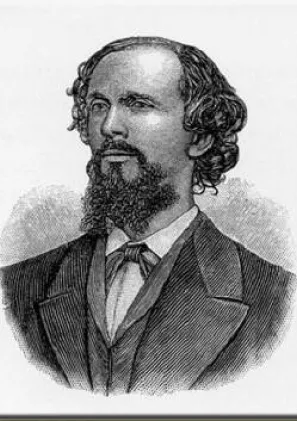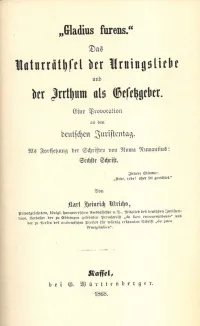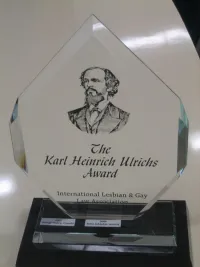Biography
1825 - 1895
“Until my dying day I will look back with pride that I found the courage to come face to face in battle against the spectre which for time immemorial has been injecting poison into me and into men of my nature. Many have been driven to suicide because all their happiness in life was tainted. Indeed, I am proud that I found the courage to deal the initial blow to the hydra of public contempt.”
– Karl Ulrichs
While working as a legal adviser, Karl Heinrich Ulrichs found his calling when he was dismissed for his sexual orientation. In 1862, he told his family and friends that he was, in his own words, an “Urning” – a term he had coined to describe what was yet to be known as a gay man. Ulrichs posited that there was a complex interplay of male and female psyches in the bodies of opposing genders – “Intersexuals” – with great variation in both the nature of their desires and the expression of their identities. He began publishing his theories when he wrote a statement of legal and moral support for a man arrested for homosexual offenses. On August 29, 1867, Ulrichs became the first homosexual to speak out publicly in defense of homosexuality when he addressed the Congress of German Jurists in Munich. Undaunted by numerous arrests, he continued to argue for the repeal of anti-homosexual laws. Published in 1870, Ulrichs’s of the Urning from Araxes: a Call to Free the Nature Penal Law is remarkably similar to the tenor of the modern lesbian and gay rights movement: “Sexual orientation is... established by nature. Legislators have no right to persecute... living creatures, who are subject to those drives nature gave them... for the sheer love of persecution... Legislators should give up hope... of uprooting the Uranian sexual drive... [for] even the most powerful government... is too weak against nature.” Though he fought German politics unsuccessfully for years, Ulrichs reflected "until my dying day I will look back with pride that I found the courage to come face to face in battle against the specter which for time immemorial has been injecting poison into me and into men of my nature. Many have been driven to suicide because all their happiness in life was tainted. Indeed, I am proud that I found the courage to deal the initial blow to the hydra of public contempt." Ulrichs’s influence on Europe’s nascent homosexual rights movement is immeasurable. The International Lesbian and Gay Law Association bestow the Karl Heinrich Ulrichs Award each year in his honor.
1825 - 1895
“Until my dying day I will look back with pride that I found the courage to come face to face in battle against the spectre which for time immemorial has been injecting poison into me and into men of my nature. Many have been driven to suicide because all their happiness in life was tainted. Indeed, I am proud that I found the courage to deal the initial blow to the hydra of public contempt.”
– Karl Ulrichs
While working as a legal adviser, Karl Heinrich Ulrichs found his calling when he was dismissed for his sexual orientation. In 1862, he told his family and friends that he was, in his own words, an “Urning” – a term he had coined to describe what was yet to be known as a gay man. Ulrichs posited that there was a complex interplay of male and female psyches in the bodies of opposing genders – “Intersexuals” – with great variation in both the nature of their desires and the expression of their identities. He began publishing his theories when he wrote a statement of legal and moral support for a man arrested for homosexual offenses. On August 29, 1867, Ulrichs became the first homosexual to speak out publicly in defense of homosexuality when he addressed the Congress of German Jurists in Munich. Undaunted by numerous arrests, he continued to argue for the repeal of anti-homosexual laws. Published in 1870, Ulrichs’s of the Urning from Araxes: a Call to Free the Nature Penal Law is remarkably similar to the tenor of the modern lesbian and gay rights movement: “Sexual orientation is... established by nature. Legislators have no right to persecute... living creatures, who are subject to those drives nature gave them... for the sheer love of persecution... Legislators should give up hope... of uprooting the Uranian sexual drive... [for] even the most powerful government... is too weak against nature.” Though he fought German politics unsuccessfully for years, Ulrichs reflected "until my dying day I will look back with pride that I found the courage to come face to face in battle against the specter which for time immemorial has been injecting poison into me and into men of my nature. Many have been driven to suicide because all their happiness in life was tainted. Indeed, I am proud that I found the courage to deal the initial blow to the hydra of public contempt." Ulrichs’s influence on Europe’s nascent homosexual rights movement is immeasurable. The International Lesbian and Gay Law Association bestow the Karl Heinrich Ulrichs Award each year in his honor.
Demography
Demography
Gender Male
Sexual Orientation Gay
Gender Identity Cisgender
Ethnicity Caucasian/White
Nations Affiliated Germany Italy
Era/Epoch Victorian Era (1837-1901)
Field(s) of Contribution
Author
Journalism
Law
Social Justice
Commemorations & Honors
International LGBTI Law Association Created the Annual Karl Heinrich Ulrichs Award for Distinguished Contributions to Sexual Equality Advancement
Streets Named After Him in Munich, Bremen, Hanover and Berlin
Demography
Gender Male
Sexual Orientation Gay
Gender Identity Cisgender
Ethnicity Caucasian/White
Nations Affiliated Germany Italy
Era/Epoch Victorian Era (1837-1901)
Field(s) of Contribution
Author
Journalism
Law
Social Justice
Commemorations & Honors
International LGBTI Law Association Created the Annual Karl Heinrich Ulrichs Award for Distinguished Contributions to Sexual Equality Advancement
Streets Named After Him in Munich, Bremen, Hanover and Berlin
Resources
Resources
Kennedy, Hubert. Ulrichs: The Life and Works of Karl Heinrich Ulrichs, Pioneer of the Modern Gay Movement. Boston: Alyson Publications, 1988.
Kennedy, Hubert. Karl Heinrich Ulrichs, Pioneer of the Modern Gay Movement. Rev. and enlarged ed. San Francisco: Peremptory Publications Ebook, 2002. Available on-line: home.pacbell.net/hubertk/.
Kennedy, Hubert. "Karl Heinrich Ulrichs, First Theorist of Homosexuality." Science and Homosexualities. Vernon A. Rosario, ed. London: Routledge, 1997. 26-45.
Ulrichs, Karl Heinrich. Forschungen über das Rathsel der mannmännlichen Liebe. Hubert Kennedy, ed. 4 vols. Berlin: Verlag rosa Winkel, 1994.
https://en.wikipedia.org/wiki/Karl_Heinrich_Ulrichs
http://hubertkennedy.angelfire.com/FirstTheorist.pdf
http://outhistory.org/exhibits/show/katz-ulrichs/katz-ulrichs
https://www.stonewallsociety.com/famouspeople/karl.htm
https://www.newyorker.com/magazine/2015/01/26/berlin-story
https://www.nytimes.com/2020/07/01/obituaries/karl-heinrich-ulrichs-overlooked.html
Resources
Kennedy, Hubert. Ulrichs: The Life and Works of Karl Heinrich Ulrichs, Pioneer of the Modern Gay Movement. Boston: Alyson Publications, 1988.
Kennedy, Hubert. Karl Heinrich Ulrichs, Pioneer of the Modern Gay Movement. Rev. and enlarged ed. San Francisco: Peremptory Publications Ebook, 2002. Available on-line: home.pacbell.net/hubertk/.
Kennedy, Hubert. "Karl Heinrich Ulrichs, First Theorist of Homosexuality." Science and Homosexualities. Vernon A. Rosario, ed. London: Routledge, 1997. 26-45.
Ulrichs, Karl Heinrich. Forschungen über das Rathsel der mannmännlichen Liebe. Hubert Kennedy, ed. 4 vols. Berlin: Verlag rosa Winkel, 1994.
https://en.wikipedia.org/wiki/Karl_Heinrich_Ulrichs
http://hubertkennedy.angelfire.com/FirstTheorist.pdf
http://outhistory.org/exhibits/show/katz-ulrichs/katz-ulrichs
https://www.stonewallsociety.com/famouspeople/karl.htm
https://www.newyorker.com/magazine/2015/01/26/berlin-story
https://www.nytimes.com/2020/07/01/obituaries/karl-heinrich-ulrichs-overlooked.html





